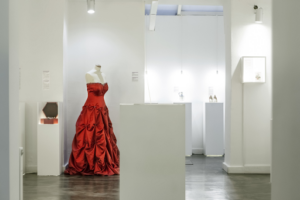By: Danielle Thomas
My passion for history and the field of museum studies began when I was a child. Like many school children, I took a field trip to a museum as a young student and on this trip, I fell in love with history and museums. My experience as a visitor led me to where I am today: a Master’s student in Museum Studies. While museums are transformative for many visitors like me, visitors are just as important for museums. Museums exist to serve their audiences, and making sure that visitors feel represented and enjoy their experience is a vital aspect of museum work. So what is the best way to ensure visitors have a good museum experience? Gathering visitor feedback is key.
Recently in Museum Education class, we discussed visitor evaluation and how important it is to the world of museum education and museums as a whole. Dr. Silverman defined visitor evaluation as the practice of systematically gathering information about people – including actual or potential visitors – to inform and improve museum practice. Essentially, visitor evaluation uses principles, practices, and methods of social science including psychology, sociology, marketing, statistics, and other fields to gather information on what visitors, or potential visitors, think about what they have encountered or want to experience in the museum. According to evaluation expert Randi Korn (1994) and others, there are three major kinds of museum visitor evaluation: 1) front-end evaluation, which takes place before an exhibit or program has been created; 2) formative evaluation, which occurs when the creative process is underway, but there is still time to make changes; and 3) summative evaluation, which happens at the end a.k.a., sums it all up. Many museums also implement outcome evaluation, which gauges whether or not intended outcomes have been achieved.
This semester, we have been so lucky to have the opportunity to work with the Museum of Broken Relationships (MBR), headquartered in Zagreb, Croatia. In collaboration with MBR and the IUPUI Museum Studies Program, we are creating a Museum of Broken Relationships exhibit right here in Indianapolis. This opportunity is very exciting and I am thankful to be working with them to help create educational programs to go along with this exhibit. In class, we also discussed the importance of partnerships. Not only are we partnering with MBR for this project, but we also have community partners we can turn to in order to help us as we develop these programs. They know their community members best, so their input can be seen as a form of front-end evaluation that can help us create the best programming possible.

A snapshot of a Museum of Broken Relationships exhibit including a red formal gown. Image credit: Museum of Broken Relationships and Mare Milin, photographer.
Donations from individuals around the globe are at the core of every Museum of Broken Relationships exhibit. In Indianapolis, we collected donations from community members throughout September and October, and these items will create the MBR Indianapolis exhibit. Everyone has experienced some sort of heartbreak in their lives, and MBR shows that people aren’t alone and provides a space to donate objects to the collection from their own heartbreak. Ordinary people can see themselves in these exhibits, and it’s important to gauge these reactions to create future exhibits and programming.
Keeping in mind the wants and needs of visitors is essential. Not only will it keep visitors coming to the museum, but it can help them be more apt to learn in the process. People are more likely to attend and pay attention to programming that speaks to them. The programs can be something they are interested in, or even something poignant about the city or world they live in. That is why visitor evaluation is so vital to the field of museum education. In these turbulent times, museums are often looked to as beacons of information and truth. It’s important that we support our public, and make sure they are experiencing what they want to see and learn from an institution like a museum.
I am so excited for the opportunity to engage with visitors at the Indianapolis exhibit of the Museum of Broken Relationships coming next year, and I can’t wait to hit the ground running, implementing these amazing new programs we have planned. Stay tuned, we may just have the perfect program for you!
Danielle Thomas holds a Bachelor’s degree in History and is a first-year Museum Studies graduate student at IUPUI.

